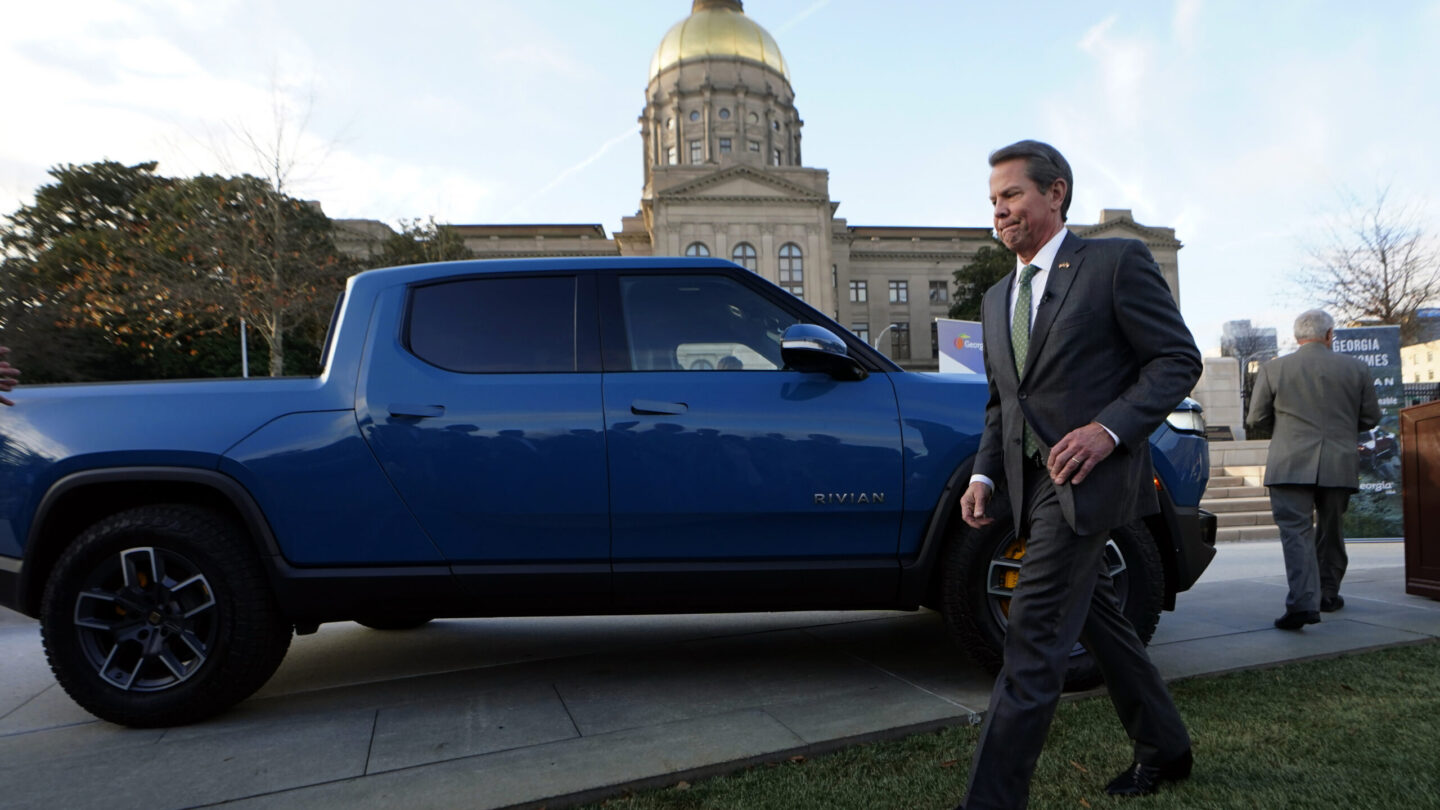Rivian will bring more climate jobs to Georgia, even as the state lags on climate policy

Gov. Brian Kemp smiles as he stands next to a Rivian electric truck during a ceremony to announce that the electric truck makers plans to bring business to Georgia on Thursday, Dec. 16, 2021, in Atlanta.
AP Photo/John Bazemore
This coverage is made possible through a partnership with Grist, a nonprofit, independent media organization dedicated to telling stories of climate solutions and a just future.
Electric truck manufacturer Rivian’s announcement last week that it would build a $5 billion plant in Georgia makes it the latest in a string of businesses promising green jobs in the state.
But while Georgia has welcomed solar companies, a large battery manufacturer and now Rivian, the state lags on policies that would help cut the emissions that cause climate change.
That disconnect isn’t unusual, said Morgan Higman, a fellow in the energy security and climate change program at the Center for Strategic and International Studies.
“In many ways, I think the governor and officials that have worked to attract Rivian are not necessarily interested in electric vehicles for their climate benefits,” she said. “They’re interested in economic benefits.”
Switching to electric vehicles is key to fighting climate change. The transportation sector is the country’s number one source of greenhouse gas emissions, according to the U.S. Environmental Protection Agency.
So advocates like Anne Blair, senior EV policy manager at the Electrification Coalition, are celebrating the new Rivian plant planned for Rutledge, east of Atlanta.
“Electric is the future and having a huge manufacturing hub for basically the next wave of technology, and it being in the automotive sector, it just offers a lot of opportunities,” she said.
Georgia may be a great state to build EVs in, but it’s not the friendliest state for people who want to buy them.
In 2015, Georgia replaced its EV tax credit with an annual fee to cover the gas taxes electric car drivers aren’t paying. And while electric car-maker Tesla has a carveout in Georgia allowing it to sell directly to customers rather than through a dealership, other new EV companies seeking to bypass the dealership model have not been granted the same benefit.
Similarly, it’s not the friendliest state for rooftop solar, even though solar technology is made here. And the state has no emissions reduction targets.
A report Higman co-wrote for CSIS found several states including Georgia, South Dakota, Texas, Wyoming and Louisiana that are actively pursuing the economic opportunities of low-carbon industries despite a lack of “climate ambition,” or decarbonization plans.
In Georgia, the report found, “existing competitive advantages in solar and batteries create opportunities for business, regardless of any climate ambition set at the state level.”
Still, the planned Rivian plant in Georgia could push more people in the state to buy electric vehicles, said Dan Matisoff, a Georgia Tech economist.
“Having these things out on the roads, having people working in the plants going and talking to their friends about it, talking to their family about it, that creates an induced demand,” he said.
Blair said that may be especially true because Rivian makes trucks and SUVs, which are more popular than compact cars.
There’s some chance that all those new electric drivers would demand Georgia change its EV policies. But Higman and Matisoff said it’s not the end of the world if that doesn’t happen.
More EVs on the road means cleaner air locally, which Matisoff said is a good reason to promote them. But “most economists would agree that a lot of the incentives placed for electric vehicles are maybe not the most efficient way to reduce carbon dioxide,” he said.
Far more effective to reduce national and global emissions, Matisoff said, are policies like the Biden administration’s move to switch the federal government’s fleet — some 600,000 cars and trucks — to zero-emission vehicles.
And manufacturing electric vehicles, solar panels and other green technologies in Georgia still helps drive emissions reductions nationwide. Without it, states like California and New York will have a hard time hitting their decarbonization targets.
“We’re also going to need supply chains for those technologies,” Higman said. “And in many cases, those resources are going to be supported, at least in part, by states like Georgia and Louisiana and Wyoming, which we might not think of as climate leaders, but are nonetheless important when we think about decarbonization goals and creating a high tech low carbon energy future.”








